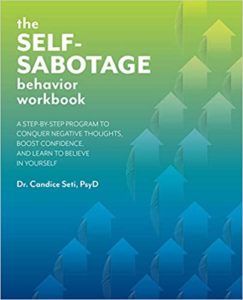Self-Sabotaging can ruin your professional and personal life and make you miserable
“Your life is ultimately measured by your outcomes. It is not about what you wanted to do or would have done but didn’t have the time. It’s not about why you thought you couldn’t; it’s just whether or not you eventually did. When you’re in a pattern of self-sabotaging behavior, you’re often treating those excuses the same way you would measurable outcomes: You are using them to make yourself feel momentarily satisfied, using them as a replacement for the accomplishment itself.”-Brianna Weist
Disclaimer: This post contains affiliate links. Should you make a purchase through those links, I may earn a small commission, at no additional cost to you. Know that I stand behind all the products I promote. All book suggestions on this post are highly recommended to understand the topic discussed in this post.
In past posts, I have explored and discussed finding life’s purpose and how that achievement contributes significantly to a life of abundance and happiness.
There are multiple factors in a person’s life that might be keeping them from achieving their goals and dreams. This piece will deal with self-sabotaging behavior. The post will explore what this unhealthy habit means, ways we self-sabotage, the reasons why we do it, and ultimately, how to stop this behavior for good.

The Self-Sabotage Behavior Workbook
Know that by identifying this pattern of behavior and addressing it adequately, you can find your path to a happier, more fulfilled life. Keep reading for valuable information that will help you to uncomplicate your life, paving the way to a more healthy, abundant existence.
Most of us are constantly sabotaging ourselves in one way or the other. The first step to avoiding self-sabotaging is identifying the things you are doing that are working against you in the long run.
What Is Self-Sabotaging?
Self-sabotaging is the act of doing something against our best interest and is more common than you think. No one is immune to self-sabotage, even if everything appears fine from the outside. However, if you struggle with the persistent problem of pressing the self-destruct bottom on your goals, it could be a sign that your subconscious mind is fighting the future you are trying to create (more of this later).
We know what is good for us. We all want to be productive, successful, confident, happy, and healthy. So, why is it so difficult to do well for ourselves and get what we want?
The reason is that we are constantly battling against our inner self-saboteur, which doesn’t want the best for us. If you want to live a life true to yourself, you need to act, so those sneaky self-sabotaging habits will not rule forever.

A Psychological Definition of Self-Sabotage
According to the article, What is Self-Sabotage? How to Help Stop the Vicious Cycle, by Christina R. Wilson, Ph.D., “Self-sabotage occurs when we destroy ourselves physically, mentally, or emotionally or deliberately hinder our own success and wellbeing by undermining personal goals and values (Brenner, 2019). It is “insidious, profound, and universal” and emanates from negative mindsets (Berg, 2015).
To better understand the previous definition, self-sabotage can be conscious or unconscious, depending on the level of awareness. Unconscious self-sabotage happens when a personal goal or value has been undermined but not initially recognized. An example of conscious self-sabotage is deciding to eat cake, despite a goal to eat healthily.
Someone with a fear of failure might wait until the last minute to work on an important project, unconsciously avoiding the prospect of advancement (Wignall, 2020)
Before getting into the origin of this unhealthy behavior, understanding what causes it, and what to do to stop it for good, let’s take a look at some practical examples of what self-sabotage might look like in your own life.
Examples of self-sabotage behavior
People from all walks of life sabotage themselves by letting negative thoughts spiral out of control. Everyone engages in self-sabotage from time to time. For some people, it’s an occasional thing with relatively minor consequences. But for others, it’s a chronic pattern that leads to major problems in their life, work, and relationships.
As personal development is one of the main goals of my blog, the information provided in this piece will hopefully help some women who find themselves in this predicament. Behavioral changes are easier said than done, but we can all make significant achievements with commitment and willpower.
There are specific behaviors and patterns that are indicative of self-sabotage, and they usually relate to being aware that there is a problem in your life. Here are some of the most representative ways we all practice self-sabotage.
- Avoiding Behaviors. Those who remove positive things from their lives.
Keep us stuck in negative and self-destructive cycles:
- Procrastination. One of the most universal forms of self-sabotage; delaying something even though we know it would be better not to.
- Chronic tardiness. Being constantly late for things erodes your relationships. It leads to a lack of trust and respect with friends and family members.
- Giving up when things get rough. Avoiders generally keep themselves away from situations that cause them anxiety or push them out of their comfort zone. Doing so limits growth opportunities reinforces fear and removes positive and enjoyable experiences from life.
- Lack of assertiveness. The self-protector. This is someone who’s constantly covered in metaphorical armor. As a result, their romantic relationships are profoundly affected, never having any real depth, emotionally, or, in many cases, longevity.
- Destructive Behaviors.
- Overindulging. Typical behaviors include overeating, excessive drinking or drug abuse, pornography, smoking, gambling, self-injury, and overspending. The overindulger lacks moderation and balance, and they tend to see things in black and white. This pattern of behavior prevents them from achieving goals and sets them up to believe they have no self-control.
- Counterproductive Mindsets. Those who lower their Self-Worth.
- Self-Criticism. Negativity, disorganization, indecisiveness, and negative self-talk. Folks who are constantly analyzing their behavior and beating themselves up. This type of thinking sets them up to have low self-esteem and makes them unable to push themselves up.
- Perfectionism and Imposter Syndrome. This thinking creates an all-or-nothing behavior loop-creating avoidance behavior. Perfectionism holds us back from showing up and trying or doing the important work in our lives.
- Mindless distractions. An insidious and ubiquitous form of self-sabotage. These distractions include binge-watching TV, surfing the internet, scrolling through social media, video game obsession, and internet shopping.
- Ungrounded Fears. Rational fears are essential for safety. However, when fears become unbalanced, they hold us back from progress in careers and personal life.
- Fearing Commitment and Intimacy. Many people find themselves in the habit of intentionally abandoning or ruining otherwise healthy friendships and romantic partnerships. This type of behavior is also called resistance.
- Fearing the unknown, change, failure, and losing control. In life, there will be people, situations, and circumstances that are upsetting, infuriating, or saddening. When you are only able to process half of your emotions, you stunt yourself. You start going out of your way to avoid any possible situation that could feel frustrating or uncomfortable because you have no tools to handle that feeling (limited emotional processing skills).

Why do we Self-Sabotage? The Causes
Simply put, self-sabotage is when you undermine your own goals and values.
In other words, you acknowledge that there’s something out there you genuinely want and believe is good for you, but then you do things that directly conflict with that goal.
No one intentionally decides to self-sabotage. Why then do we sometimes chronically execute these destructive behaviors?
According to research, the following can be possible reasons.
- Patterns learned in childhood. Modeling
The patterns laid down in our earliest relationships (including a parent who lacked the confidence to succeed) often repeat in relationships throughout life. We are attached to these patterns, and they are hard to give up. The parent who consistently warns a child to be careful at the playground may cause the child to internalize the world as unsafe and exploration to be avoided.
- Irrational fears
Self-sabotaging behaviors emerge from the fear of success and the fear of failure. Ironically, we fear both (success and failure) which is why it’s common for people to feel paralyzed. The fear of failure is easier to understand. The fear of success is less recognized but more terrifying. Success brings commitment, responsibility, and pressure.
- Past traumas
Like your belief system, the most prominent traumas develop in childhood when your mind is highly receptive. Rejection, abandonment, violence, assault, embarrassment, fear, failures, etc., can give rise to shame, pity, unworthiness, regret, aggression, anxiety, depression, loneliness, self-doubt, self-criticism, and self-hatred. If we don’t heal the traumas, they dictate our behavior all our lives.
- Limiting beliefs
Your belief system is the blueprint for your behavior. Unless you consciously change them, none of your beliefs are yours. How many of those beliefs come from your family, friends, society, media, environment, or the circumstances you live in. The world programmed your mind for you.

How to overcome self-sabotaging behavior and stop it for good
The origins of self-sabotage are rooted in emotional experiences, often from childhood. Healing shame from childhood can release us from this cycle.
The journey to overcome this destructive behavior is about identifying the origins of powerlessness that choreograph our toxic thoughts.
Understand the need your self-sabotage fills. Find your why.
The ability to recognize triggering thoughts is an essential first step for transforming self-sabotage patterns.
So, the first thing you need to do is understand why you are doing what you are doing (what need it’s filling). After that, you need to get creative about identifying healthier, less destructive ways to meet that need.
Before you get tough on yourself and commit to changing, get compassionate with yourself and commit to understanding.
To recognize that your self-sabotage is serving a purpose, you need to stop judgment about the ultimate negative consequences of the behavior and be understanding enough to see that it is serving a function that, at least in a limited sense, makes sense.
–If you need t stop abusing alcohol, you need to compassionately understand that alcohol “serves” to alleviate your stress after work.
–If you want to stop procrastinating, you need to compassionately understand that procrastinating helps you avoid fear or failure (or fear of success).
Identify alternative healthy behaviors that fill that need—practice, practice, practice.
Often, just getting clarity on the underlying need will be enough to trigger ideas for alternative behaviors.
Once you are aware of these toxic thoughts, there are several ways to transform or deactivate them. Here are some suggested techniques:
Positive self-talk
Self-Compassion
Rewriting the narrative with humor
Practice making new choices. Practice can help you push through those emotional barriers and create new habits.
Tap into your strengths
Reflect on goals that you achieved in the past. Write down how you reached this goal and make a list of the strength that helped get you there.
Consider therapy
A licensed therapist can help you in changing the habits which no longer serve you. Behavior therapies teach techniques that focus on the problematic thoughts or actions that may be getting in the way of successfully reaching your goals.
The Takeaway
Self-sabotaging behavior is a challenging cycle to break, but it’s not impossible.
It simply means chronically doing something that undermines your own goals or values.
Self-sabotage can be a painful experience. It interferes with every aspect of your life and makes changes more complicated than they need to be.
It’s paramount to understand that people self-sabotage for several different reasons and in all different areas of life. Self-sabotaging may be a form of protection or risk-taking. It may also be rooted in limiting core beliefs or early life experiences where people did not learn self-trust.
The cycle is hard to break because doing so requires accountability, commitment, and getting out of your comfort zone.
If you want to stop self-sabotaging behavior, start with some self-compassion. Any habit or pattern that doesn’t serve you or fulfill your needs is worth looking at deeply with help.
You need to remember that, as detrimental as this behavior might be to you now, it used to serve a useful function in your life.
The key is to understand what need it serves and then develop alternative behaviors that fill the same need more healthily and productively.

